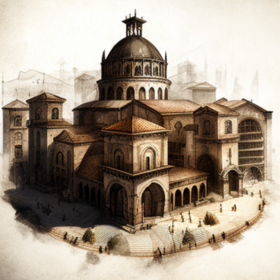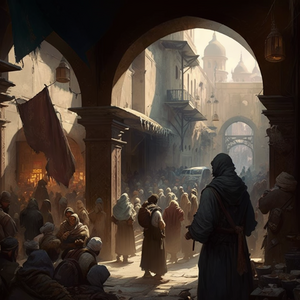Tref
| Tref | |
| Political details | |
|---|---|
| Capital | Oordar |
| Government | Monarchy |
| Language | Bukk Thonthal Nalarli |
| Religion | Davinia Xaewoon Foft |
| Historical details | |
| Established | c. 1590 SR |
| Conquered | 1873 SR |
Tref was a country to the east of Homestead, founded by brothers Hee and Iar of the Oordar clan. It was then famously ruled by Mayeerqnoel for a period of about 150 years.
Tref was the first country to mark a move away from Wewen's mission of colonizing the east, and was instead pronouncedly multicultural, with New Dawn mixing in with the tarnarian migrants, crossing the Taverda river into Homestead.
Tref was aligned with Darda and became an opponent of Yammoe in the region. It did have stable relations with True Wewen, but did not lend it military support against the Daurates. In the beginning of the 18th century Tref invaded the state of Ginsag, leading to its dissolution.
Tref was conquered by Dod Overpol and effectively became the heart of the Overpol Expanse in the 70s of the 19th CSR.
Etymology
The exact meaning of "Tref" is unknown. One of the hypotheses is that it is a version of the name of the Taverda river in Nalarli, which in the south of Homestead was referred to as "Taver" or "Tavef".
Early history
Tref was established as a state at around the 90s of the 16th CSR by the Oordar clan, which ruled many cities in northern Tarnaria. Brothers Hee and Iar became rulers of Delbar by virtue of being from the Oordar clan and promising the hand of their sister to its Murdoh, Zor Beekin, which would make him part of the powerful house.
They then marched on Kamey-Yr, which at the time was a major trade center between Darda and Tarnaria and was also controlled by the Oordar clan. This set up a conflict between Hee and Iar and the rest of the family, resulting in the brothers' uncle Pherro arriving to Delbar. Pherro knew nothing about the deal that Hee and Iar had made with Zor, so on arrival he bribed several commanders of the Delbar army and took control of the city. Zor was given no chance to explain the situation and was thrown in prison.
As the news reached the brothers, Iar marched on Delbar with a significant regiment and set up siege. Meanwhile, citizens of Delbar, feeling that they were being used as pawns in the Oordar clan power games, revolted and threw Pherro out, closing the gates and proclaiming independence from the Oordar clan altogether. That seemed to satisfy Iar, who took Pherro as prisoner and marched back to Kamey-Yr.
Pherro was imprisoned at Kamey-Yr and used as a bargaining chip between the brothers and the rest of the clan. As Pherro was an important figure in the family, head of the family Kren the Younger agreed to exchange Pherro for the city of Orden, which was a small city, but an important supplier of wood. The exchange was to happen in front of the Orden gates between Hee and the representative of the Oordar clan, but nobody showed up. Hee began to suspect an ambush and demanded Orden to open its gates. The gates were opened and Hee's army was let in without incident.
It soon became known that there was no ambush and that Kren the Younger was, in fact, murdered: his decision to submit to Hee and Iar's demands was interpreted as a sign of weakness and used by Hee's cousin Rodare to grab power. Rodare nullified the agreement and began preparing for a campaign, to regain both Orden and Kamey-Yr.
The murder of Kren the Younger, however, changed the power balance: Pherro, who was Kren the Younger's beloved brother and was next in line as head of the family, offered his support to Hee and Iar. This both undermined Rodare's status as head of the family, but also increased the brothers' chances, since Pherro was able to recall his personal regiment to Orden before the clan's forces even began the journey.
As Hee and Pherro were preparing for the battle at Orden, Rodare's forces suddenly appeared under the walls of Kamey-Yr. This was an unexpected turn of events and after a brief skirmish in the narrow city streets, Iar ordered his army to retreat.
Having lost Kamey-Yr and Delbar, Hee, Iar and Pherro were now stuck in the small city of Orden as Rodare's army was swiftly approaching, not entirely sure that the battle is even worth it. Someone told Hee that the city had a superhero warrior. It turned out to be Farnole, a young lady in her twenties. Her ability was significant, but she was reluctant to help, since she disliked the Oordar clan: she claimed that her family was wronged by Kren's brother. Hee told her that Rodare is the grandson of Kren's brother. She then agreed and used her powers to vanish Rodare and his whole army, inadvertently setting off a causal loop that created the clan.
Their enemy gone, Hee, Iar and Pherro were now free to rule Orden and go back and reclaim Kamey-Yr.
Expansion
Over the next decade the brothers and their uncle have expanded their country by both campaigning and building: the city of Garood was built in order to secure Hee's lands from Uzder. It was named in honor of Pherro's newborn son, Garood Oordar.
Gulun-Yr, a large ancient city with close ties to Teamatian and a unique culture of religious conquests, which terrorized and devastated the northern lands for centuries, including Ronas, decided to retake its sister city, Kamey-Yr, almost immediately. This led to the battle at Kamey-Yr, which Hee and Pherro were able to defend. They then chased the battered army and attacked the defenseless Gulun-Yr. However, for the next several years they had to constantly defend the city against an influx of Teamatian tribes which considered the city to be their territory. The citizens also did not accept Hee's rule, uprising regularly. Eventually, the situation did stabilize, as several tribes united to form the Stau Daurate and focused on internal power struggles.
Conflict with Delbar
Initially, Delbar's independence was not a big problem for Hee and Iar, because it effectively reduced Oordar clan's influence, while they sat in the more economically important Kamey-Yr. However, as the situation with the clan was resolved and they were now the only important representatives of the clan, Hee began to see Delbar's continued independence with growing frustration. Already in 1602 SR he once more sent Iar against the city, but the city's Council had a good network of spies, was informed of the coming forces and instead launched a preemptive strike on Iar, catching him by surprise and forcing him to flee. Although in both cases - in the case of Rodare suddenly appearing at Kamey-Yr and Delbar attacking Iar without notice - Iar was probably just unlucky, this seemed to have irreparably damaged his status in the eyes of Hee, and Iar would never again lead an army. He would die several years later under suspicious circumstances.
After Iar's failure, Hee would be forced to wait almost 10 years before marching on Delbar with an enormous army, anxious to finally complete this unfinished business, when Garood was attacked by a Baat general. This made Hee direct his army to Garood. Meanwhile, Delbar once again planned to launch a preemptive attack on their potential conqueror, and when they saw Hee turn to Garood, they followed him, waited until his army engaged with the enemy at Garood and then brutally attacked from behind. Just like it happened with Iar, Hee did not expect this turn of events and was now in-between two hostile forces. He decided to retreat and was able to do so, albeit suffering heavy losses. The army of Delbar continued to follow Hee's army up to Oordar, and then laid siege to the city. This forced Hee to enter into negotiations with Delbar and sign a peace treaty, which guaranteed that Tref would officially recognize the independence of Delbar, while Delbar agrees to lend military support to Tref in the defense of Tref's southern border.
Immediately after signing, the army of Delbar, reinforced with Oordar regiments, marched on Garood. In the ensuing battle they were able to achieve a decisive victory and force Baat's army out.
As a result, Delbar and Oordar armies kept a joined regiment at Garood, and Delbar maintained its independence throughout all of Tref's history.

